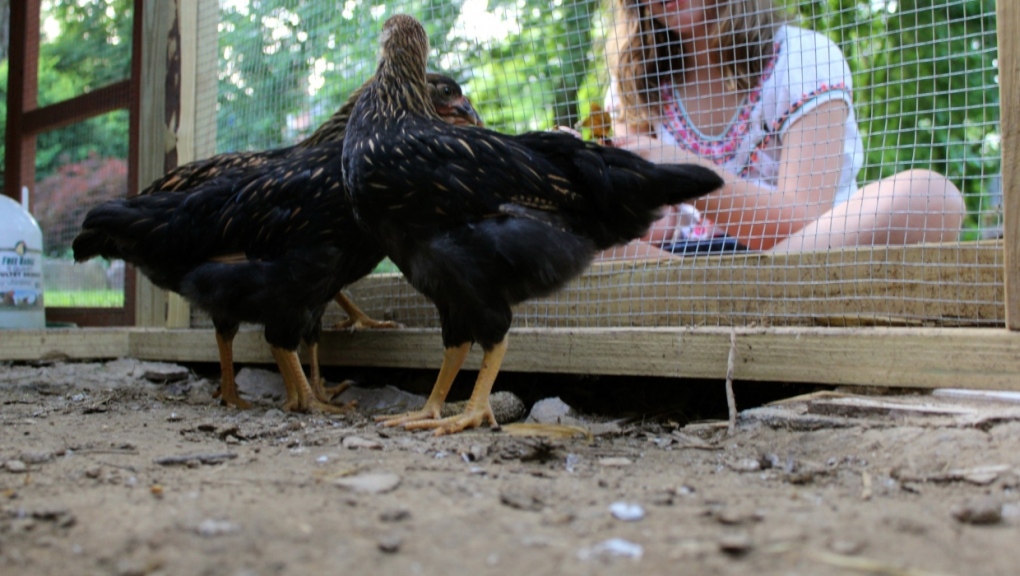Calgary will soon award first urban hen licences amid avian flu outbreaks
 A young girl can be seen feeding two black chicken in a chicken coop in a backyard in the city. (City of Calgary)
A young girl can be seen feeding two black chicken in a chicken coop in a backyard in the city. (City of Calgary)
Calgarians who applied to the city's urban hen ownership program will soon find out if their application was successful.
A spokesperson for the City of Calgary says they received 204 applications and used a lottery to select 100 people who have been approved.
"The successful applicants have been receiving their notifications this week," said Jennifer Chiesa with Calgary community standards in an email to CTV News.
City council decided to allow Calgarians to keep hens last year while updating the responsible pet ownership bylaw.
The changes to the bylaw went into effect on Jan. 1, and on March 21 residents were able apply for a livestock licence to keep hens.
Once applicants receive a licence, peace officers will have to conduct a backyard and coop inspection before they're allowed to acquire any hens.
Once approval is granted, licensed hen keepers must ensure the birds remain in the coop or an enclosed run, and stay on the licensed property.
The city says the program is aligned with national care guidelines and structured similar to other municipalities across Canada.
To be approved for hen ownership, Calgarians have to meet a set of criteria, including being at least 18 years old, completing hen-keeping training and owning the property the hens will live on – or having written consent from the property owner.
AVIAN FLU IMPACTS
When asked if the city has any concerns about avian flu as officials prepare to launch the program, Chiesa said the flocks allowed in Calgary are too small to be a concern.
"Avian flu does not typically occur in smaller hobby flocks, and the backyard hens will be limited to groups maximum of four per household," she said.
Future henkeepers will also be taught about how to ensure biosecurity when they take their training, including lessons on how to deal with sick birds.
In a statement to CTV News, the Canadian Food Inspection Agency (CFIA) said that birds in a single flock at one premise pose a "very low" likelihood of transmitting avian influenza compared to commercial facilities.
Patrick Girard, CFIA spokesperson, recommended owners of small flocks keep their birds confined for the duration of the migration period, from June until the end of fall migration from November to December, to minimize contact with wild birds and further reduce the risk of disease transmission.
"Highly pathogenic avian influenza (HPAI) is highly transmissible and may pass to small flocks directly (bird-to-bird contact) or indirectly (contact with contaminated feed, water or equipment)," Girard said.
The CFIA urged bird owners to follow five basic rules to minimize transmission risks:
- preventing contact with wild birds and other animals;
- frequently cleaning poultry coops, waterers, feeders, your clothing and boots;
- spotting signs or symptoms of HPAI and reporting them early;
- limiting exposure to visitors; and
- keeping new birds separate when entering your flock.
CTVNews.ca Top Stories

Mark Carney reaches out to dozens of Liberal MPs ahead of potential leadership campaign
Mark Carney, the former Bank of Canada and Bank of England governor, is actively considering running in a potential Liberal party leadership race should Justin Trudeau resign, sources tell CTV News.
'I gave them a call, they didn't pick up': Canadian furniture store appears to have gone out of business
Canadian furniture company Wazo Furniture, which has locations in Toronto and Montreal, appears to have gone out of business. CTV News Toronto has been hearing from customers who were shocked to find out after paying in advance for orders over the past few months.
WATCH Woman critically injured in explosive Ottawa crash caught on camera
Dashcam footage sent to CTV News shows a vehicle travelling at a high rate of speed in the wrong direction before striking and damaging a hydro pole.
A year after his son overdosed, a Montreal father feels more prevention work is needed
New data shows opioid-related deaths and hospitalizations are down in Canada, but provincial data paints a different picture. In Quebec, drug related deaths jumped 30 per cent in the first half of 2024, according to the public health institute (INSPQ).
Rideau Canal Skateway opening 'looking very positive'
As the first cold snap of 2025 settles in across Ottawa, there is optimism that the Rideau Canal Skateway will be able to open soon.
Much of Canada is under a weather alert this weekend: here's what to know
From snow, to high winds, to extreme cold, much of Canada is under a severe weather alert this weekend. Here's what to expect in your region.
Jimmy Carter's funeral begins by tracing 100 years from rural Georgia to the world stage
Jimmy Carter 's extended public farewell began Saturday in Georgia, with the 39th U.S. president’s flag-draped casket tracing his long arc from the Depression-era South and family farming business to the pinnacle of American political power and decades as a global humanitarian.
'A really powerful day': Commemorating National Ribbon Skirt Day in Winnipeg
Dozens donned colourful fabrics and patterns Saturday in honour of the third-annual National Ribbon Skirt Day celebrated across the country.
Jeff Baena, writer, director and husband of Aubrey Plaza, dead at 47
Jeff Baena, a writer and director whose credits include 'Life After Beth' and 'The Little Hours,' has died, according to the Los Angeles County Medical Examiner.

































